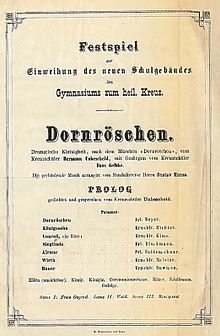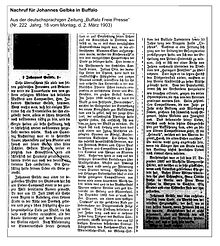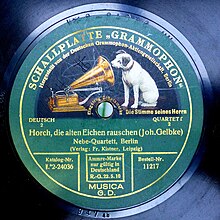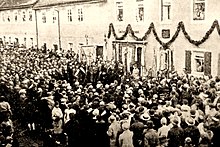Johannes Gelbke
Johannes Woldemar Gelbke (born July 19, 1846 in Radeberg ; † March 1, 1903 in Buffalo ) was a German composer , choir director , conductor and singer . He was best known in Germany for his song “Horch! The old oaks rustle ... ” (homecoming). Also in the USA , where he lived and worked from 1882, he worked as a composer, conductor, choir director and singer.
Life
Johannes Gelbke was born in Radeberg at Stolpener Straße 7 (today there is a memorial plaque on the house). Father Ernst Ludwig Gelbke (* 1812 Radeberg, † unknown) was a “ horse doctor and company smith in the local Königl. Saxon. Brigade Reiter Artillerie ”in the Radeberger Garrison .
On the recommendation of his teachers, Johannes was accepted as an alumnus (boarding school student) and because of his excellent soprano voice in the alumni choir ( Dresdner Kreuzchor ) after attending the Radeberger elementary school at the " Gymnasium zum heiligen Kreuz Dresden " ( Kreuzschule ) . The then cantor of the Kreuzchor and composer Julius Otto quickly recognized the boy's musical abilities, introduced him to ecclesiastical music and gave him lessons in music theory .
The young Gelbke was already composing songs and church choirs here .
On April 30, 1866, the evening before the inauguration of the new Kreuzschule on Georgplatz in Dresden, the "Dramatic Trifle: Sleeping Beauty" was premiered in the hall of the famous Lincke'schen Bad , a by Kreuzschule student Hermann Unbescheid (later professor and Prof. Dr.) Singspiel written and set to music by Johannes Gelbke . On the evening of the consecration day, May 1, 1866, the performance was repeated in the presence of the king and the Saxon princes. This success was the motive for the Kreuzschule student Johannes Gelbke to devote himself entirely to music after graduating from high school in 1868.
Gelbke went to Leipzig in 1868 and attended the “ Royal Conservatory of Music ” in the subjects of composition , theory and piano. He took his exam with Ignaz Moscheles . Teachers in theory and composition were u. a. Thomaskantor Prof. Friedrich Richter and Dr. Oscar Paul . Gelbke was a guest student in music history and acoustics at Leipzig University . With this solid education he became a music teacher (voice and piano) in Leipzig and worked as a choir conductor. From 1869 he also headed several choral societies in Wurzen .
In 1882, Gelbke received an offer from Buffalo to take on the position of conductor of the renowned "Orpheus" choral society in the new "Music Hall Buffalo". Buffalo was a center of German-born emigrants in the USA who continued to cultivate their German traditions here, including German songs. He left Germany on November 22nd, 1882 and began conducting on December 14th, 1882 in Buffalo.
The home of the “Orpheus” choir, the “New Music Hall Buffalo”, burned down in March 1885, and in November 1885, Gelbke handed over the direction of the choir to Carl Adam. For several years, Gelbke was the conductor of the "Buffalo Singers Association" and also conducted the "Central Singers Association", which is made up of 12 regional singing societies, the "Mendelssohn Club", the "Beethoven Club", the "Singing Section of the Buffalo Gymnastics Association" and many other choirs and choirs Choral societies. From 1884 to 1894 he was the conductor of the "Niagara Falls Orpheus". At the "23th North American Music Festival" in Buffalo in 1883, in which 72 choirs with 2,100 singers took part, Gelbke conducted the choir of the singer association with 600 singers with great success. He also worked for the "Liedertafel" Buffalo. As director of the renowned "Harugari Frohsinn" choir, he led it to its artistic boom. Gelbke earned his income as a private music teacher.
On December 27, 1887, he married Mathilde, born in Buffalo in 1856. Hütter, daughter of a German family of lawyers.
Johannes Gelbke died of a heart attack on March 1st, 1903 in Buffalo . The German-language newspaper "Buffalo Freie Presse" honored him on March 2, 1903 with a detailed obituary.
Works
His best-known work in Germany is the setting of Emil Schimpke's poem “Heimkehr” , which is still sung by male choirs and quartets under the title “Horch, die alten Eichen rauschen” . Contrary to other sources and traditions, according to which Gelbke is said to have created this composition on the occasion of a later visit to his hometown Radeberg, he had already set the poem Heimkehr to music before leaving Germany in November 1882, which is evidenced by a sheet of music autographed and dated by Gelbke. Recordings of this song were already published by many German manufacturers around 1910 .
Song "Heimkehr" or "Listen, the old oaks rustle"
Listen to this song:
Text: (Spelling and sentence according to the original by Emil Schimpke in )
- Listen! The old oaks rustle
- Still the same song;
- Otherwise everything has changed
- since I left home.
- I left with escort,
- Strange and lonely I move here,
- Heart, how full of sinews you are!
- Home, oh, how empty you are!
- Just the old church bells
- Sing their pious song
- Otherwise Welcome has offered me
- No dear voice sounded
- And no shiny eye wished
- Kindly return home happiness to me.
- Heart! Home became a stranger
- Why did you come back
- Only the forest has kept you
- Behind the berry-rich Hague
- Well-known green, blooming
- And the old Finkenschlag;
- Soft whispers, youthful dreams,
- Home labor, peace of the heart;
- And the old oaks rustle
- Still the same song!
Other works
to
- Sleeping Beauty, Dramatic Trifles, based on texts by Hermann Unbescheid
- 11 settings for male choirs (with arrangements for voices and piano), including 6 more poems by Emil Schimpke in addition to "Heimkehr":
- On high mountain Op. 6 No. 1
- Scheidelied Op. 6 No. 2
- Elfenreigen Op. 13
- Starry Night Op. 15th
- Homecoming Op. 16 No. 1
- Morning Song Op. 20th
- Night Thoughts, without No.
- Greetings to the night Op. 7, text by H. Waldow
- Heroes Celebration Op. 16 No. 1, text by Julius Sturm
- Farewell Op. 18 No. 1, text by P. Schönfeld
- Flag Song Op. 18 No. 2 Text by Scholl
- "Jubilate Amen" Op. 8, hymn for soprano solo, male choir and orchestra with the text by the Irish national poet Thomas Moore , set to music by Max Bruch (Opus 3) among others as early as 1856
- the 100th psalm “Shout for joy to the Lord” Op. 17 for acc. Choir, wind instruments, timpani / organ
- Wedding song for mixed choir Op. 12 according to the words of the Bible , Ruth I
- various songs for 4 and 5 male voices, solos and choir, Op. 9 - 11 and 19, according to texts a. a. by Joseph von Eichendorff
No specific information is available about his numerous compositions from 1882 in Buffalo.
Appreciations
Saxon Elbgau Singers Association
For the 40th anniversary of the “Gruppe Radeberg” in the Saxon Elbgau-Singer Association , a bronze memorial plaque was inaugurated on September 7, 1930 at his birthplace in Radeberg, which is still there today.
Gelbkehain
On the occasion of his 100th birthday on July 19, 1946, a park in his hometown Radeberg was renamed Gelbkehain in his honor . The facility is located in the city center, directly on the course of the Große Röder . A memorial stone also erected in 1946 reminds of Gelbke.
further reading
- Klaus Schönfuß: Johannes Gelbke (1846-1903), a Radeberg composer goes to America ; in: Radeberger Blätter zur Stadtgeschichte , Volume 12, 2014; Ed .: Large district town Radeberg in cooperation with the AG Stadtgeschichte
Web links
Individual evidence
- ↑ a b c Klaus Schönfuß: Johannes Gelbke (1846-1903), a Radeberg composer goes to America; in: Radeberger Blätter zur Stadtgeschichte Volume 12 . Ed .: Large district town Radeberg in cooperation with the AG Stadtgeschichte. Elaboration by Gottfried Beier, local history researcher, Radeberg, Radeberg 2014.
- ^ ADB: Julius Otto, composer
- ↑ a b c History of the Germans in Buffalo and Erie Counties, NY Verlag Reinecke & Zesch, Buffalo 1898, p. 66/67 ( online ).
- ^ A b Emil Schimpke: Poems . Dieterich'sche Verlagbuchhandlung Theodor Weicher , Leipzig 1909. OCLC 699874400
- ↑ City History Museum Leipzig; Object z0077600. Chronicle of the men's choir Ottendorf-Okrilla
- ↑ http://www.dismarc-audio.org/GHT/GHT001/001_22_a.mp3
- ↑ Directory of the Musikalien-Verlag by Fr. Kistner in Leipzig 1894 Section I; SLUB Dresden
| personal data | |
|---|---|
| SURNAME | Gelbke, Johannes |
| ALTERNATIVE NAMES | Gelbke, Johannes Woldemar (full name) |
| BRIEF DESCRIPTION | German composer, conductor and singer |
| DATE OF BIRTH | July 19, 1846 |
| PLACE OF BIRTH | Radeberg |
| DATE OF DEATH | March 1, 1903 |
| Place of death | Buffalo |







